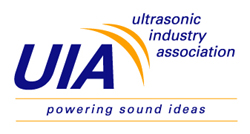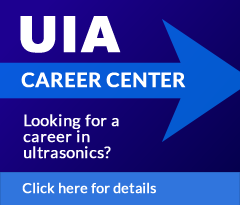Symposium
Technical Co-Sponsor IEEE/UFFC |
Join the Ultrasonic Innovation Wave at UIA54 – Salt Lake City
Get ready to experience the forefront of ultrasonic technology at UIA54, hosted in Salt Lake City – a vibrant hub of innovation and discovery. This premier symposium brings together global leaders, pioneering researchers, and forward-thinking manufacturers to explore the latest breakthroughs in ultrasonic applications.
From industrial advancements to medical marvels, UIA54 offers a dynamic program that bridges research and real-world impact. Engage in thought-provoking sessions on the convergence of ultrasonic technologies, and gain practical insights through a hands-on workshop focused on intellectual property strategy and entrepreneurial growth.
Connect with an international network of experts from top-tier universities and industry giants, all passionate about shaping the future of ultrasonics. Whether you're a seasoned professional or a rising innovator, UIA54 is your gateway to inspiration, collaboration, and cutting-edge knowledge.
Don’t miss your chance to be part of this transformative event.
Discover what’s next in ultrasonics – only at UIA54.
Submit your presentation abstract here
New Sponsorship Levels Now Available
Our network of experts from top-tier universities and industry giants, all passionate about shaping the future of ultrasonics come from around the world.. Whether you're a seasoned professional or a rising innovator, UIA54 is your gateway to inspiration, collaboration, and cutting-edge knowledge.
Click here for UIA54 Sponsorship Opportunities
Register BEFORE 20 February for the best registration fees.
See the REGISTER tab below for this year's fee schedule.
Registration is NOW OPEN
Hotel Reservations at the Salt Lake City Hilton
Our Symposium hotel is located In central Salt Lake City, a two-minute walk from Salt Palace Convention Center. City Creek Center mall and Temple Square are both within a half-mile of our door. Cottonwood Canyon is 40 minutes away, offering summer hiking, biking, and climbing, as well as winter skiing. Room rate is $194 per night, plus taxes.
Click here to make your hotel reservations
Featured Speakers
Sponsorships and Exhibits Information
Here is the 2025 UIA Sponsorship for UIA54. Please call Fran Rickenbach at 937.586.3725 if you have questions or email. We look forward to working with you.
UIA54 Program Schedule will be posted shortly - Halifax 2025 Program Schedule is below
Monday, 28 April 2025 - Industrial Sessions
|
Manufacturing and Testing Ultrasonic Sensors for Extended Lifetimes and Long Term Repeatability |
Charlie Dowling, Ceramtec |
|
Optimizing the Mechanical Quality Factor of Ultrasonic Transducers |
Dominick DeAngelis, Kulicke & Soffa |
|
A High-Performance Piezo Stack Energy Harvester for Railway Applications |
Dong Wang, University of Exeter |
|
Invited Speaker: Mae Seto |
Dalhousie University, Can |
|
Piezoelectric Material Characterisation for the Design of Industrial Ultrasonic Transducers |
Sandy Cochran, U of Glasgow, UK |
|
Characterisation of Textured Piezoceramics and Performance Evaluation in Single Element Transducers |
Anna Alexandrou, U of Glasgow,UK |
|
Piezoelectric materials: RoHS Status & Future |
Rasmus Lou-Moeller, CTS |
|
Open Forum: Current Status of Piezoelectric Materials & Security of Supply |
|
|
Incorporation of Lead-free Piezoceramic Material in a Power Ultrasonic Transducer |
Olubunmi Onanuga,U of Glasgow, UK |
|
Incorporating lattice scaffolds in Langevin transducers: ultrasonic fatigue and stress analysis |
Ehsan Malekipour, U of Glasgow, UK |
|
In-Process Quality Monitoring of Ultrasonic Metal Welding |
Amin Moghaddas, EWI |
|
Account of Time Served |
Karl Graff, Beechwood Ultrasonics |
Tuesday, 29 April 2025 Workshops: Concept to IP
|
Miniature Ultrasound technology for Precision Imaging and Therapy |
Professor Jeremy Brown, Dalhousie University, Halifax |
|
Turning Ideas Into Business |
Kevin Houser |
|
Forum: Concept to IP Jeff Leadbetter, CEO, DAXSONICS Melanie Nadeau CEO, COVE Sailu Nemana, Director, Ceramics Business Unit Sensor Technology Adam Gray, Chief Engineer R&D, Ultra Maritime |
|
Wednesday, 30 April 2025: Medical
|
Integrated Sensor System to Quantify the Forces Applied During Ultrasonic Periodontal Debridement |
Martin Hofmann, U of Bern, Ch |
|
FEA simulation of ultrasonic bone surgery |
Alicia Gardiner, U of Glasgow, U |
|
A novel approach to evaluating ultrasound effects on the osteogenic differentiation of human mesenchymal stromal cells attached on titanium surfaces in vitro |
Olga Yevlashevskaya, U of Birmingham, UK |
|
Invited Speaker: Kullervo Hynynen |
Sunnybrook University |
|
Ultrasonic Surgical Devices: New Requirements for Characterization |
Mark Schafer, West Virginia University, US |
|
Complex Material Property Characterization and Modeling of Piezoelectric Ceramics for High-Power Ultrasonic Applications |
Alexandr Kiyashko, Nami Surgical, UK |
|
Comparison of Synthetic, Animal, and Human In Vitro Bone Models for Intraosseous Temperature and Cutting Force Measurements in Ultrasonic Osteotomy, |
Oskar Okaya, U of Bern, Ch |
|
Vibrational Characteristics of Langevin Transducers Assembled with TPMS Lattice Front Masses |
Weihuan Kong, U of Glasgow |
Posters
- Monitoring water temperature in ultrasonic flow measurement using electrical impedance, Zhijun Qian, U of Glasgow, UK
- High-Performance Ultrasound Transducers Fabricated Using Sm-Doped PIN-PMN-PT Piezocrystal/Epoxy 1-3 Composite, Sandy Cochran, U of Glasgow, UK
Registration
Register for the UIA Symposium
UIA54 Registration Fees
Live registration fees:
| Before 20 February 2026 | 20 February- 31 March 2026 | 1 - 22 April 2026 | |
| Member - full | $ 950 | $ 1,050 | $ 1,150 |
| Member - daily | $ 380 | $ 420 | $ 460 |
| Nonmember - full | $ 1,250 | $ 1,350 | $ 1,450 |
| Nonmember - daily | $ 500 | $ 540 | $ 580 |
| Student full | $ 525 | $ 550 | $ 575 |
| Student - daily | $ 210 | $ 220 | $ 230 |
UIA is pleased to underwrite student participation as a full symposium participant OR as a poster presenter. Students submitting posters have the choice of adding either the Monday Industrial Sessions or the Wednesday Medical Sessions at no additional charge.
Featured Speakers
General Information
UIA54 Code of Conduct
UIA is committed to providing a safe, productive, and welcoming environment for all meeting participants and staff. All participants are expected to abide by this Virtual Programs Code of Conduct.
UIA has zero-tolerance for any form of discrimination or harassment, including but not limited to sexual harassment by participants or our staff at our meetings.
Unacceptable Behavior is defined as:
- Harassment, intimidation, or discrimination in any form.
- Verbal abuse of any participant or UIA staff member.
- Examples of verbal abuse include, but are not limited to, verbal comments related to gender, sexual orientation, disability, physical appearance, body size, race, religion, national origin, inappropriate use of nudity and/or sexual images in public spaces or in presentations or threatening or stalking any participant.
Travel Info
Hotel Reservations at the Salt Lake City Hilton
Our Symposium hotel is located In central Salt Lake City, a two-minute walk from Salt Palace Convention Center. City Creek Center mall and Temple Square are both within a half-mile of our door. Cottonwood Canyon is 40 minutes away, offering summer hiking, biking, and climbing, as well as winter skiing. Room rate is $194 per night, plus taxes.
Click here to make your hotel reservations
Tuesday Evening


